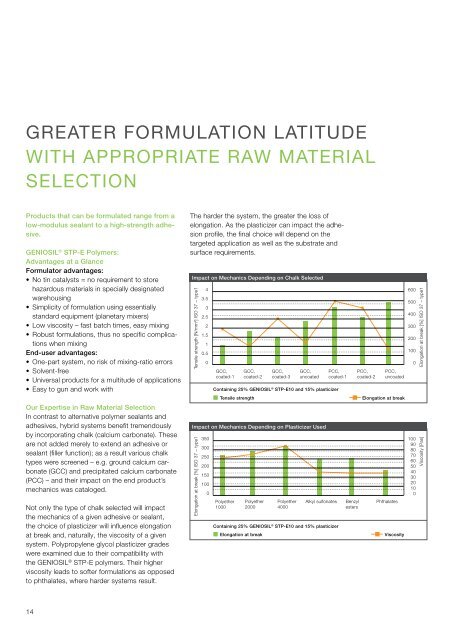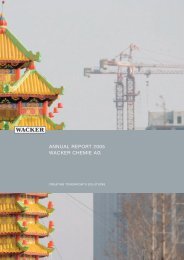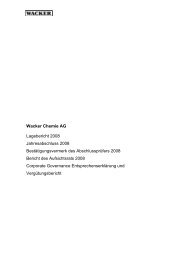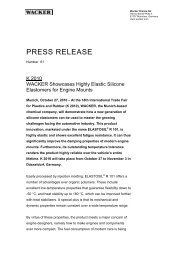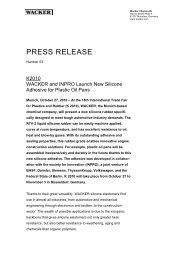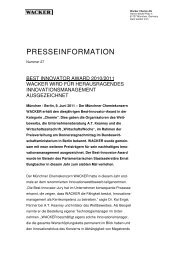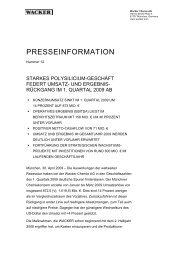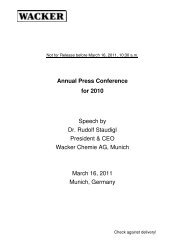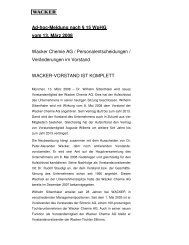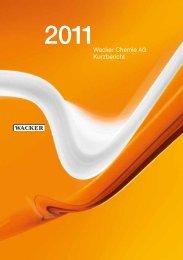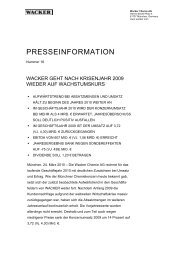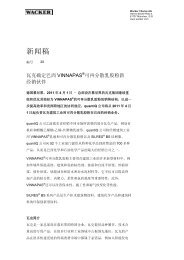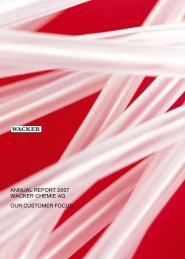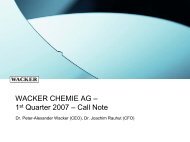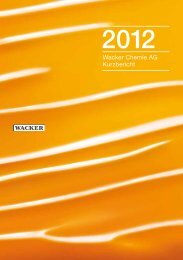PDF | 1.2 MB - Wacker Chemie
PDF | 1.2 MB - Wacker Chemie
PDF | 1.2 MB - Wacker Chemie
You also want an ePaper? Increase the reach of your titles
YUMPU automatically turns print PDFs into web optimized ePapers that Google loves.
GREATER FORMULATION LATITUDE<br />
WITH APPROPRIATE RAW MATERIAL<br />
SELECTION<br />
Products that can be formulated range from a<br />
low-modulus sealant to a high-strength adhesive.<br />
GENIOSIL ® STP-E Polymers:<br />
Advantages at a Glance<br />
Formulator advantages:<br />
• No tin catalysts = no requirement to store<br />
hazardous materials in specially designated<br />
warehousing<br />
• Simplicity of formulation using essentially<br />
standard equipment (planetary mixers)<br />
• Low viscosity – fast batch times, easy mixing<br />
• Robust formulations, thus no specific complications<br />
when mixing<br />
End-user advantages:<br />
• One-part system, no risk of mixing-ratio errors<br />
• Solvent-free<br />
• Universal products for a multitude of applications<br />
• Easy to gun and work with<br />
Our Expertise in Raw Material Selection<br />
In contrast to alternative polymer sealants and<br />
adhesives, hybrid systems benefit tremendously<br />
by incorporating chalk (calcium carbonate). These<br />
are not added merely to extend an adhesive or<br />
sealant (filler function); as a result various chalk<br />
types were screened – e.g. ground calcium carbonate<br />
(GCC) and precipitated calcium carbonate<br />
(PCC) – and their impact on the end product’s<br />
mechanics was cataloged.<br />
Not only the type of chalk selected will impact<br />
the mechanics of a given adhesive or sealant,<br />
the choice of plasticizer will influence elongation<br />
at break and, naturally, the viscosity of a given<br />
system. Polypropylene glycol plasticizer grades<br />
were examined due to their compatibility with<br />
the GENIOSIL ® STP-E polymers. Their higher<br />
viscosity leads to softer formulations as opposed<br />
to phthalates, where harder systems result.<br />
14<br />
The harder the system, the greater the loss of<br />
elongation. As the plasticizer can impact the adhesion<br />
profile, the final choice will depend on the<br />
targeted application as well as the substrate and<br />
surface requirements.<br />
Impact on Mechanics Depending on Chalk Selected<br />
Tensile strength [N/mm 2 ] ISO 37 – type1<br />
Elongation at break [%] ISO 37 – type1<br />
4<br />
3.5<br />
3<br />
2.5<br />
2<br />
1.5<br />
1<br />
0.5<br />
0<br />
GCC,<br />
coated-1<br />
GCC,<br />
coated-2<br />
GCC,<br />
coated-3<br />
GCC,<br />
uncoated<br />
PCC,<br />
coated-1<br />
Containing 25% GENIOSIL ® STP-E10 and 15% plasticizer<br />
PCC,<br />
coated-2<br />
PCC,<br />
uncoated<br />
Tensile strength Elongation at break<br />
Impact on Mechanics Depending on Plasticizer Used<br />
350<br />
300<br />
250<br />
200<br />
150<br />
100<br />
0<br />
Polyether<br />
1000<br />
Polyether<br />
2000<br />
Polyether<br />
4000<br />
Alkyl sulfonates Benzyl<br />
esters<br />
Containing 25% GENIOSIL ® STP-E10 and 15% plasticizer<br />
Phthalates<br />
Elongation at break Viscosity<br />
600<br />
500<br />
400<br />
300<br />
200<br />
100<br />
0<br />
100<br />
90<br />
80<br />
70<br />
60<br />
50<br />
40<br />
30<br />
20<br />
10<br />
0<br />
Elongation at break [%] ISO 37 – type1<br />
Viscosity [Pas]


